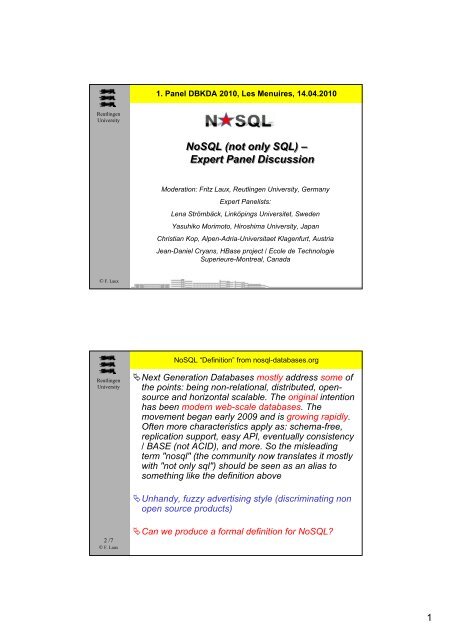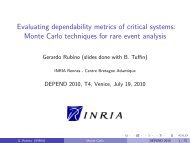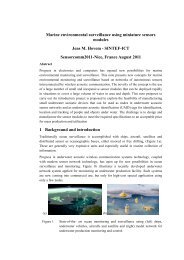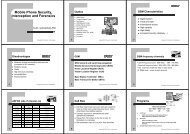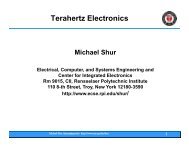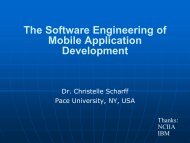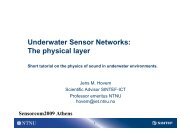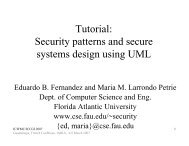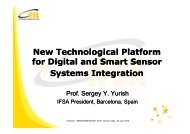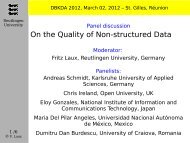NoSQL (not only SQL) - iaria
NoSQL (not only SQL) - iaria
NoSQL (not only SQL) - iaria
Create successful ePaper yourself
Turn your PDF publications into a flip-book with our unique Google optimized e-Paper software.
1. Panel DBKDA 2010, Les Menuires, 14.04.2010<br />
Reutlingen<br />
University<br />
<strong>No<strong>SQL</strong></strong> (<strong>not</strong> <strong>only</strong> <strong>SQL</strong>) –<br />
Expert Panel Discussion<br />
Moderation: Fritz Laux, Reutlingen University, Germany<br />
Expert Panelists:<br />
Lena Strömbäck, Linköpings Universitet, Sweden<br />
Yasuhiko Morimoto, Hiroshima University, Japan<br />
Christian Kop, Alpen-Adria-Universitaet Klagenfurt, Austria<br />
Jean-Daniel Cryans, HBase project / Ecole de Technologie<br />
Superieure-Montreal, Canada<br />
© F. Laux<br />
<strong>No<strong>SQL</strong></strong> “Definition” from nosql-databases.org<br />
Reutlingen<br />
University<br />
Next Generation Databases mostly address some of<br />
the points: being non-relational, distributed, opensource<br />
and horizontal scalable. The original intention<br />
has been modern web-scale databases. The<br />
movement began early 2009 and is growing rapidly.<br />
Often more characteristics apply as: schema-free,<br />
replication support, easy API, eventually consistency<br />
/ BASE (<strong>not</strong> ACID), and more. So the misleading<br />
term "nosql" (the community now translates it mostly<br />
with "<strong>not</strong> <strong>only</strong> sql") should be seen as an alias to<br />
something like the definition above<br />
Unhandy, fuzzy advertising style (discriminating non<br />
open source products)<br />
2/7<br />
© F. Laux<br />
Can we produce a formal definition for <strong>No<strong>SQL</strong></strong>?<br />
1
<strong>No<strong>SQL</strong></strong> Examples and Classification from nosql-databases.org<br />
Reutlingen<br />
University<br />
Core <strong>No<strong>SQL</strong></strong> Systems:<br />
Wide Column Store / Column Families<br />
Hadoop / HBase, Cassandra, Hypertable<br />
Document Store<br />
CouchDB, MongoDB, Riak<br />
Key Value / Tuple Store<br />
Amazon SimpleDB, Chordless, Redis, Scalaris, BerkeleyDB<br />
Eventually Consistent Key Value Store<br />
Dynamo/KAI/Voldemont<br />
Graph Databases<br />
Neo4J, Sones, InfoGrid<br />
Soft <strong>No<strong>SQL</strong></strong> Systems:<br />
Object Databases<br />
db4o, Versant<br />
XML Databases<br />
Mark Logic Server, eXist, Xindice, Tamino<br />
3/7<br />
© F. Laux<br />
Is there a tailored solution for every need?<br />
Ad-hoc query? Data integrity?<br />
What‘s behind the scene<br />
Reutlingen<br />
University<br />
Déjà vu concepts<br />
Hashing is faster [O(1)] than indexing [O(log(n))]<br />
or sequential access [O(n)]<br />
Navigational access (follow pointer) is faster than<br />
lookup (read and compare)<br />
Hash-maps do <strong>not</strong> support approximate access<br />
(e.g. Key > Value, Key like M*)<br />
Queries orthogonal to the access path are awesome slow<br />
no matter of the storage model<br />
Shared <strong>not</strong>hing architecture<br />
Anything really new?<br />
4/7<br />
© F. Laux<br />
2
Translation Table<br />
Reutlingen<br />
University<br />
Old name<br />
Hash file<br />
Hierarchical file<br />
(HSAM, HDAM)<br />
Parent node<br />
Local autonomy<br />
Horizontal partition<br />
New name<br />
Key-Value store<br />
BigTable<br />
Column family<br />
Partition tolerant<br />
Sharding<br />
non-ACID (atomic, consistent,<br />
isolated, durable)<br />
BASE (basically available, soft<br />
state, eventually consistent)<br />
Any more fashion terms?<br />
5/7<br />
© F. Laux<br />
Pros and Cons of <strong>No<strong>SQL</strong></strong><br />
Reutlingen<br />
University<br />
Pros<br />
Scalability, big data<br />
Fast<br />
Availability<br />
Cons<br />
Not ACID (atomic, consistent, isolated, durable)<br />
No security (authentication, authorization) Dynamo<br />
No <strong>SQL</strong> (No ad-hoc query!)<br />
data independence missing<br />
(No distinction between conceptual and storage model)<br />
Use it, if you need speed and availability<br />
and accept inconsistency including lost transactions!<br />
6/7<br />
© F. Laux<br />
May we talk about a “Database” if it does <strong>not</strong> support<br />
transactions?<br />
3
Headline Statements<br />
Reutlingen<br />
University<br />
Lena Strömbäck: Semantics first<br />
Yasuhiko Morimoto: one size doesn’t fit all<br />
Christian Kop: Data quality is important, flexibility<br />
endangers quality<br />
Jean-Daniel Cryans: Prepare yourself for the<br />
architectures of the future<br />
Fritz Laux: Core <strong>No<strong>SQL</strong></strong> = fast, scalable file structure<br />
7/7<br />
© F. Laux<br />
4
<strong>No<strong>SQL</strong></strong> databases<br />
Lena Strömbäck<br />
Department of Computer and Information Science<br />
Linköpings universitet, Sweden<br />
www.ida.liu.se<br />
April 14th 2010<br />
The Web brings new challenges<br />
• Many publishers of data<br />
• Enterprises – everyday users<br />
• Less well defined than traditional applications<br />
• Text – semi-structured - structured<br />
• New representation formats<br />
• XML – RDF – OWL – Standards - text<br />
• Parallel and mixed data models<br />
• Every user and use for their own needs<br />
2<br />
Linköpings universitet
Data storage – work so far…<br />
OWL data<br />
Document<br />
Native XML<br />
DBMS<br />
Triple store<br />
Objectrelational<br />
DBMS<br />
Hybrid<br />
Relational/Native<br />
DBMS<br />
RDF data<br />
Attribute-value<br />
stor<br />
XML data<br />
Relational<br />
DBMS<br />
Table<br />
Document<br />
store<br />
Object-oriented<br />
DBMS<br />
Graph DBMS<br />
Neo4j<br />
Native XML<br />
DBMS<br />
Graph<br />
DBMS<br />
Big table<br />
DBMS<br />
Network<br />
Store<br />
3<br />
Important issues<br />
• What are important properties of data?<br />
• Data collections<br />
• Features – semantic concepts<br />
• Automatic analysis<br />
• How to choose storage solution?<br />
• Structured comparisons<br />
• Benchmarking<br />
• How to query the data?<br />
• Conceptual model<br />
• Independent of underlying storage model<br />
• What features important<br />
4<br />
Linköpings universitet
Linköpings universitet<br />
www.liu.se
<strong>No<strong>SQL</strong></strong>: Prepare Yourself for the <br />
Architectures of the Future <br />
Jean-‐Daniel Cryans <br />
Apache HBase commiAer, part Cme <br />
master student @ ETS Montreal <br />
The Second InternaConal Conference on Advances in Databases, Knowledge, and Data ApplicaCon <br />
April 14th
• <strong>No<strong>SQL</strong></strong> isn’t really about the language, it’s more about new <br />
ways of storing and accessing data that are beAer adapted <br />
to today’s problems. <br />
• The first major issue is scaling, typically you see stories <br />
about My<strong>SQL</strong>. It usually goes like this: <br />
– Start with a single machine, with a backup to a<strong>not</strong>her one, a <br />
SAN, etc. <br />
– Setup Master/Slave replicaCon to spread the read load, start <br />
geWng rid of some indexes because they are too expensive to <br />
maintain. <br />
– VerCcally shard the original database by topics because the <br />
Master is becoming a boAle neck for the write load. RelaCons <br />
are broken between tables, JOINs are impossible when two <br />
tables are on different shards. <br />
– Get rid of most the remaining indexes because you can’t <br />
maintain them since your main boAle neck is, again, inserCng <br />
data. Tables are now accessed <strong>only</strong> by primary key. <br />
DBKDA10, April 14th <br />
2
• The second major problem is reliability. <br />
Modern RDBMS were designed with a single <br />
machine in mind, which becomes the Single <br />
Point Of Failure. Even with replicaCon, losing a <br />
read slave means a significant loss of <br />
throughput unless the cluster is over-provisioned…<br />
but those servers usually don’t <br />
come cheap (think big iron). <br />
• Finally, as Dr. Stonebraker [1] said, the “One <br />
Size Fits All” mentality of current DBMS <br />
architecture no longer applies to the database <br />
market. <br />
1. Michael Stonebraker, Uğur ÇeCntemel, "One Size Fits All": An Idea Whose Time Has Come and Gone, pp. 2-‐11, 21st <br />
InternaConal Conference on Data Engineering, IEEE Computer Society Press, Tokyo, Japan, April 2005, 0-‐7695-‐2285-‐8. <br />
DBKDA10, April 14th <br />
3
• Enters <strong>No<strong>SQL</strong></strong> (Not <strong>only</strong> <strong>SQL</strong>). <br />
• Those databases almost all share the quality of being <br />
scalable from the beginning, usually <strong>not</strong> relying on a <br />
SPOF. <br />
• They can be used for specific use cases: wide tabular, <br />
key-‐value, document and graph stores, to name a few. <br />
• In the end, we can see that <strong>not</strong> supporCng <strong>SQL</strong> wasn’t <br />
a goal, but a necessity since it doesn’t fit the <br />
supporCng data models. <br />
• Personal experience: HBase was iniCally supporCng a <br />
<strong>SQL</strong>-‐like interacCve shell and new users increasingly <br />
began asking “How can I do joins?” or “How do I <br />
declare an index?”. We finally decided to completely <br />
change the syntax in order to reduce confusion… and <br />
possibly false expectaCons. <br />
DBKDA10, April 14th <br />
4
• In conclusion, I’m <strong>not</strong> arguing that everybody <br />
should jump on the <strong>No<strong>SQL</strong></strong> wagon… It’s all about <br />
your requirements: <br />
– Do you have Big Data? A few hundred gigabytes isn’t <br />
considered that much these days and it’s easily <br />
manageable using well known techniques. Unless you <br />
are planning to scale to 10x, 100x? <br />
– Do you need all the relaConal features of RDBMS? <br />
Would simple lookups be sufficient? <br />
– Do you have millions of dollars to spend on licenses? If <br />
yes, then you probably already have geo-‐distributed <br />
Oracle clusters and you should stop worrying. If <strong>not</strong>, <br />
it’s worth researching these soluCons. <br />
DBKDA10, April 14th <br />
5
Application Engineering<br />
Panel<br />
Not <strong>only</strong> <strong>SQL</strong> Databases<br />
Christian Kop<br />
Alpen-Adria Universität Klagenfurt<br />
Application Engineering<br />
Panel<br />
Overview<br />
The need for other paradigms is <strong>not</strong> new<br />
Also at the end of the old century (1990s) databases with<br />
other paradigms were also already developed<br />
OO Databases<br />
Deductive Databases<br />
XML Databases<br />
…<br />
Nevertheless, people work with Relational Databases for<br />
30 years – WHY?<br />
2<br />
1
Application Engineering<br />
Panel<br />
Advantages of relational model<br />
Lean model based on the mathematical concept of a<br />
relation<br />
The operators (selection, projection, join, …) are a basis<br />
for a (more) declarative retrieval language.<br />
Normal forms as well as entity- referential integrity<br />
defined for relations help to identify the quality of data.<br />
In it’s core principle also understandable for Non IT<br />
Specialist (relation ~ table).<br />
The relational model is supported by reliable database<br />
management systems.<br />
3<br />
Application Engineering<br />
Panel<br />
The (organizational) environment<br />
Seems to be sufficient for general purpose applications<br />
Applications in insurance companies, banks, offices in general<br />
The life time of a technical system is much longer in the<br />
IT Practice than in universities (-> budget restrictions).<br />
The curriculum in databases is still based to a large<br />
extend on relational database systems - it’s the basis.<br />
Nearly Everyone gets a data store based on the<br />
relational model with his MS Office (MS Access)<br />
Web My<strong>SQL</strong><br />
4<br />
2
Application Engineering<br />
Panel<br />
The role of RDBMS providers<br />
Database Management systems providers are clever<br />
enough to integrate other “best practices” into their<br />
systems.<br />
ORACLE provides<br />
Object types (OO features)<br />
XML Documents and Schemas<br />
Grid databases<br />
…<br />
What comes next?<br />
5<br />
Application Engineering<br />
Panel<br />
Advantages of <strong>No<strong>SQL</strong></strong> (Why <strong>No<strong>SQL</strong></strong>)<br />
Support for a specific problem / situation<br />
No need to think in terms of relations but in terms given<br />
in a situation (e.g. documents, nodes, … )<br />
In most cases freely available<br />
In most cases open source<br />
However<br />
I am afraid that data quality will get lost if the possibilities<br />
of <strong>No<strong>SQL</strong></strong> databases are used too extensively or <strong>not</strong> in<br />
the right domain.<br />
6<br />
3
Application Engineering<br />
Panel<br />
Personal Conclusions<br />
For special needs, special No <strong>SQL</strong> databases will be<br />
used<br />
For general purpose application, relational databases will<br />
be used<br />
Open Questions / Final Statements<br />
What can/shall be said about the quality of data in<br />
<strong>No<strong>SQL</strong></strong> databases?<br />
How much flexibility is acceptable in which situation?<br />
(Flexibility and Ad-Hoc Processes NEED Control)<br />
7<br />
4
DBKDA 2010 Panel: <strong>No<strong>SQL</strong></strong><br />
<strong>No<strong>SQL</strong></strong> movement:<br />
Yasuhiko Morimoto<br />
Hiroshima University, JAPAN<br />
- Nothing new to me.<br />
- No Single Software (or API) can fit everything.<br />
-<strong>SQL</strong> can<strong>not</strong> fit everything<br />
though it have been extending (BLOB, Object relational, etc.).<br />
- So called “Key-Value-Stores (KVSs)” have been utilized for more than 5 years<br />
in emerging data management systems such as e-Commerce, SNS, etc.<br />
RDBMS<br />
ACID guarantee<br />
KVS (as examples of <strong>No<strong>SQL</strong></strong>)<br />
scalability<br />
File System<br />
trade-off<br />
Data Management software that fits in niche<br />
but important area (infrastructure, application, hardware, etc.)<br />
will increase its importance.<br />
DBKDA 2010 Panel: <strong>No<strong>SQL</strong></strong><br />
<strong>No<strong>SQL</strong></strong> movement:<br />
Yasuhiko Morimoto<br />
Hiroshima University, JAPAN<br />
As a “knowledge discovery and data mining” researcher,<br />
I welcome this movement because …<br />
if huge data is stored in <strong>No<strong>SQL</strong></strong>, there is a demand of data mining technology<br />
there must be new challenging open problems in <strong>No<strong>SQL</strong></strong> Era.<br />
such as “how to find knowledge”<br />
under <strong>No<strong>SQL</strong></strong> conditions<br />
(ACID guarantee is very weak<br />
difficult find unexpected linkage between one key entry and a<strong>not</strong>her<br />
database size is too large to handle etc.)


